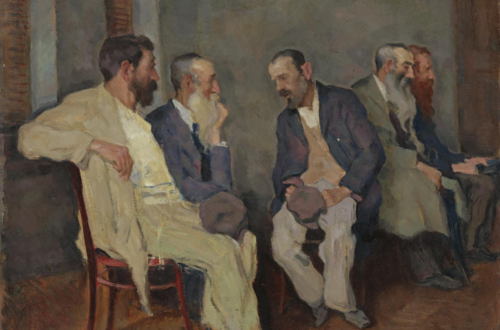My paper can no more make an argument than my computer can hope for a Cubs win. People write papers and in those papers people express propositions in sentences that constitute arguments. ‘I’ is the first person pronoun and I use it to refer to myself, the person writing the paper. If I want to tell you something I am going to do in my paper, I will tell you that I will be the one doing it: “In this paper, I will argue…”
‘One’ is a personal pronoun referring to anyone to which some property or other might apply. If I say, ‘one might argue ~q’, I am referring to anyone who has the property of thinking that it is not the case that q. It might be the case that no one has the property in question.
When I say, ‘the atheist believes that p’, I am talking about a paradigmatic example of a person who denies that God exists. I am picking on a singular person to stand for a kind of person. This is not the same as ‘one’. A paradigm of a kind picks out the properties that do in fact apply to those people of that kind. It is not a sign for anyone to which some property might apply. Instead of saying “one might think that pigs can fly”, which would merely apply to anyone who thinks pigs might fly, I am saying that there is a kind of person who thinks pigs can fly and referring to a paradigmatic example of that kind of person.
For much of our history, English speakers have used the generic masculine pronoun to refer to a paradigmatic person. In recent years, this has been abolished among academics due to ideological feminism. It is supposed that the continual use of ‘he’, ‘his, and ‘him’ when talking about professions conditions the writer and reader to think of those professions as properly occupied only by men. I suppose the idea is that when a paper says, “The soccer coach is skillful, but he is also a leader”, the image that comes to mind is of a male soccer coach. Perhaps, but it does not follow that the person who has the image–the reader of the paper–then goes on to think that only men ought to be soccer coaches.
Out of all the bad options we have (‘they’, ‘he or she’, ‘he/she’, ‘(s)he’, ‘ze’ etc), I chose merely to replace the generic ‘he’ with a generic ‘she’. I reserve the masculine pronoun for referring to those kinds of people generally perceived negatively. My reasoning is thus: Most people who read what I have to say are not ideologically committed to feminism and have no problem with generic pronouns of either gender. Consequently, they will also probably not come to think of professions being properly occupied only by females due to my use of a generic feminine. This is simply because sentences in which a generic pronoun appears are easily distinguished from sentences in which a pronoun picks out a particular person. In other words, generic pronouns are clearly used in order to pick out a kind of person of either gender rather than a particular person of a single gender.
I have sometimes wondered if I could simply talk about ‘you’ since it is you, the person reading this, to whom I write. This has drawbacks. Consider the following sentence: ‘you might think that X. But you would be mistaken.’ An unavoidable response from a reader would be ‘why would you think I would think X?’ So, unless my tone is caring and considerate, I avoid ‘you’ while not avoiding you, dear reader.



